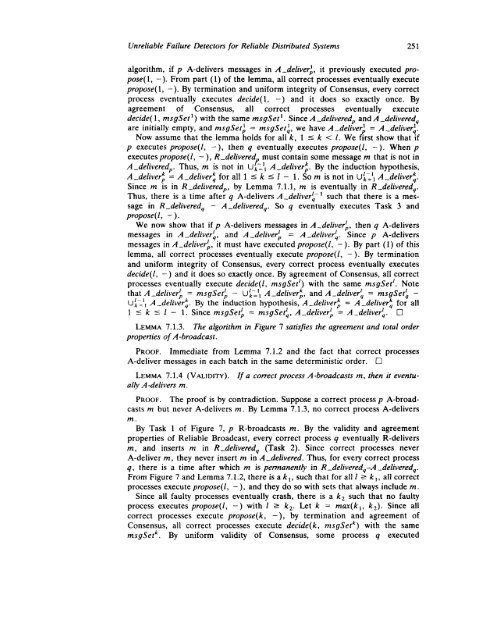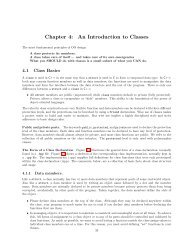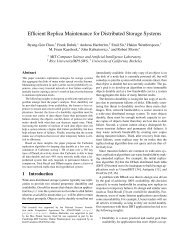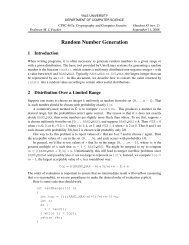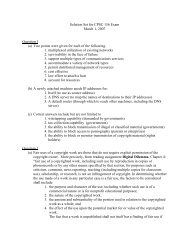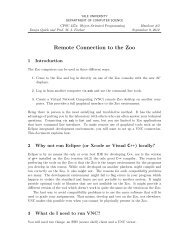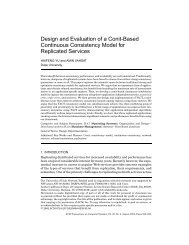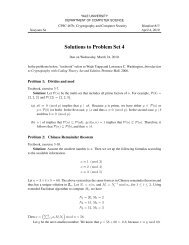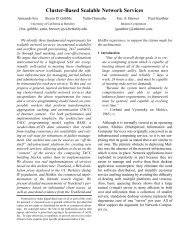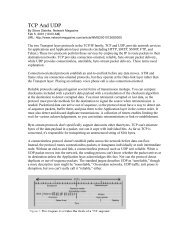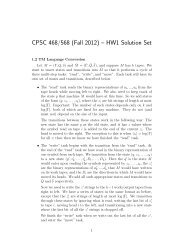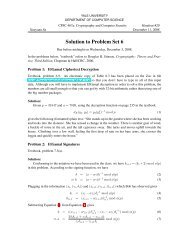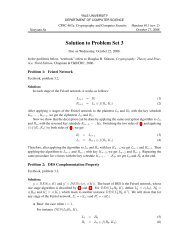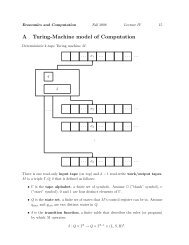Unreliable Failure Detectors for Reliable Distributed Systems
Unreliable Failure Detectors for Reliable Distributed Systems
Unreliable Failure Detectors for Reliable Distributed Systems
You also want an ePaper? Increase the reach of your titles
YUMPU automatically turns print PDFs into web optimized ePapers that Google loves.
<strong>Unreliable</strong> <strong>Failure</strong> <strong>Detectors</strong> <strong>for</strong> <strong>Reliable</strong> <strong>Distributed</strong> <strong>Systems</strong> 251algorithm, if p A-delivers messages in A _de/iver~, it previously executed propose(1, –). From part (1) of the lemma, all correct processes eventually executepropose( 1, –). By termination and uni<strong>for</strong>m integrity of Consensus, every correctprocess eventually executes decide(l, -) and it does so exactly once. Byagreement of Consensus, all correct processes eventually executedecide( 1, msgSet ]) with the same msgSet 1. Since A _deiiveredP and A _delivered~are initially empty, and msgSet~ = msgSet~, we have A _deliver~ = A _de!iver~.Now assume that the lemma holds <strong>for</strong> all k, 1 < k < /. We first show that ifp executes propose(l, - ), then q eventually executes propose(l, - ). When pexecutes propose(l, – ), R_de/ivered must contain some message m that is not inA _deliveredP. Thus, m is not in U~l]l A _deliver~. By the induction hypothesis,A _deliver~ = A _deliver$ <strong>for</strong> all 1 s k s 1 – 1. So m is not in U~j*l A _deliver~.Since m is in R_deliveredP, by Lemma 7.1.1, m is eventually in R_deliveredq.Thus, there is a time after q A-delivers A _deliver&- ] such that there is a messagein R _delivered~ – A _deliveredq. So q eventually executes Task 3 andpropose(l, –).We now show that if p A-delivers messages in A _deliver~, then q A-deliversmessages in A _deliver~, and A _deliver~ = A _deliver~. Since p A-deliversmessages in A _deliver~, itmust have executed propose(l, –). By part (1) of thislemma, all correct processes eventually execute propose(l, –). By terminationand uni<strong>for</strong>m integrity of Consensus, every correct process eventually executesdecide(l, – ) and it does so exactly once. By agreement of Consensus, all correctprocesses eventually execute decide(l, msgSet~) with the same msgSet’. Notethat A _deliver~ = msgSet~ – U jL1l A _deliver~, and A _deliver~ = msgSet~ –U~~’l A _deliver~. By the induction hypothesis, A _deliver~ = A _deliver~ <strong>for</strong> all1 s k s i – 1. Since msgSet~ = msgSet~, A_deliver~ = A_deliver~. ❑LEMMA 7.1.3. The algorithm in Figure 7 satisfies the agreement and total orderproperties of A-broadcast.PROOF. Immediate from Lemma 7.1.2 and the fact that correct processesA-deliver messages in each batch in the same deterministic order. ❑LEMMA 7.1.4 (VALIDITY). If a correct process A-broadcasts m, then it eventuallyA-delivers m.PROOF. The proof is by contradiction. Suppose a correct process p A-broadcastsm but never A-delivers m, By Lemma 7.1.3, no correct process A-deliversm.By Task 1 of Figure 7, p R-broadcasts m. By the validity and agreementproperties of <strong>Reliable</strong> Broadcast, every correct process q eventually R-deliversm, and inserts m in R_deliveredq (Task 2). Since correct processes neverA-deliver m, they never insert m in A _delivered. Thus, <strong>for</strong> every correct processq, there is a time after which m is permanently in R_deliveredq-A _deiivered~.From Figure 7 and Lemma 7.1.2, there is a kl, such that <strong>for</strong> all 1> kl, all correctprocesses execute propose(l, –), and they do so with sets that always include m.Since all faulty processes eventually crash, there is a k2 such that no faultyprocess executes propose(l, – ) with 1 a kz. Let k = max(k ~, k2). Since allcorrect processes execute propose(k, –), by termination and agreement ofConsensus, all correct processes execute decide(k, msgSet~) with the samemsgSetk. By uni<strong>for</strong>m validity of Consensus, some process q executed


